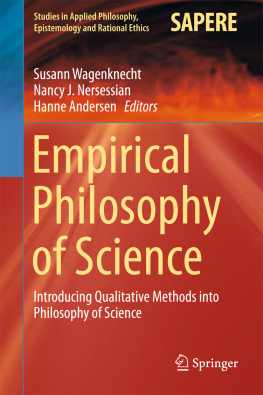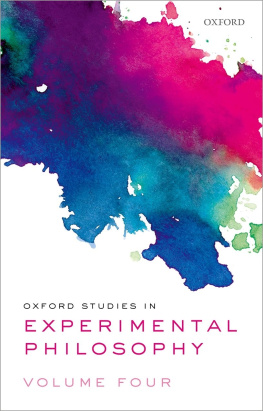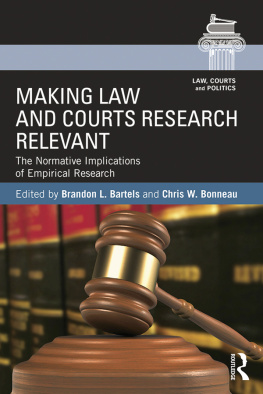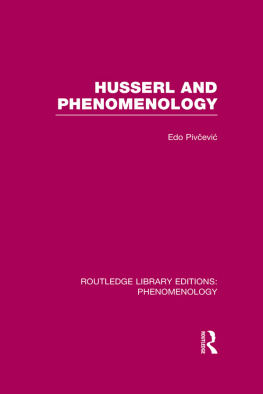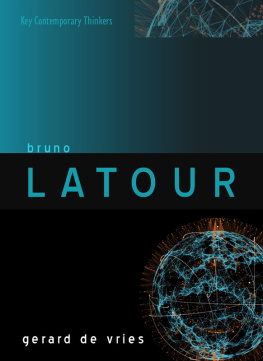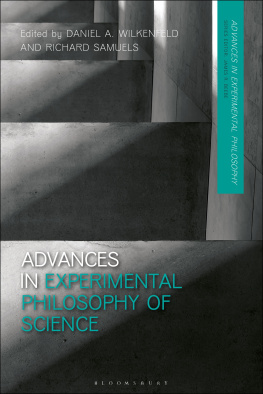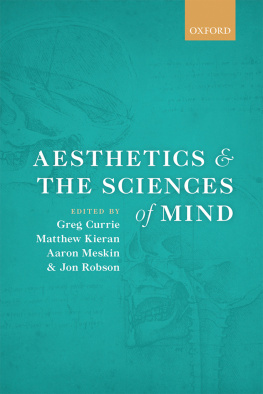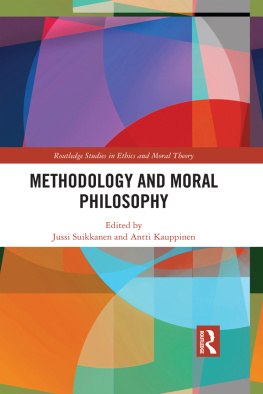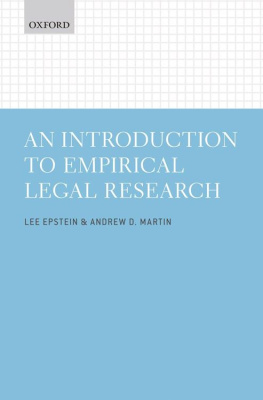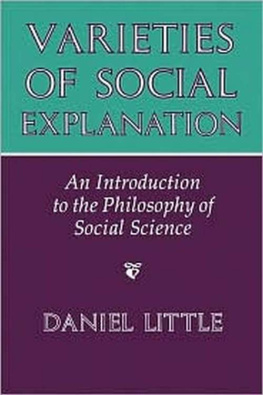Springer International Publishing Switzerland 2015
Susann Wagenknecht , Nancy J. Nersessian and Hanne Andersen (eds.) Empirical Philosophy of Science Studies in Applied Philosophy, Epistemology and Rational Ethics 10.1007/978-3-319-18600-9_1
Empirical Philosophy of Science: Introducing Qualitative Methods into Philosophy of Science
Abstract
A growing number of philosophers of science make use of qualitative empirical data, a development that may reconfigure the relations between philosophy and sociology of science and that is reminiscent of efforts to integrate history and philosophy of science. Therefore, the first part of this introduction to the volume Empirical Philosophy of Science outlines the history of relations between philosophy and sociology of science on the one hand, and philosophy and history of science on the other. The second part of this introduction offers an overview of the papers in the volume, each of which is giving its own answer to questions such as: Why does the use of qualitative empirical methods benefit philosophical accounts of science? And how should these methods be used by the philosopher?
Introduction
When philosophers of science make use of qualitative methods, they draw upon a long and rich research tradition that is rooted in the social sciences and has gradually been adopted in other fields. The use of qualitative methods in philosophy of science brings philosophers in close contact with philosophically inclined social scientists studying science, and at the same time it brings forth new perspectives on the classical problem of the integration of history and philosophy of science. This introduction will give an overview of the new relations to sociology of science and history of science brought about by the use of qualitative methods, and it will shortly present the papers in the volumeeach of which gives its own answer to two questions: Why does the use of qualitative empirical methods benefit philosophical accounts of science? And how should these methods be used by the philosopher?
1.1 History and Philosophy of Science
The role that empirical insight can play in the philosophy of science is extensively debated in discussions on the relevance of historical to philosophical accounts of science (and vice versa). The relation between history and philosophy of science has been an issue of contention for half a century. In the late 1950s and early 1960s, a new historiography of science developed that aimed at describing past science in its historical integrity rather than through the lens of the present, and by doing so it provided an image of science that seemed to differ from the image entailed by standard philosophical accounts at the time. Historically inclined philosophers of science therefore began suggesting that philosophy of science should be concerned with the historical structure of science rather than with an ahistorical, logical structure that they saw as having little relation to the actual scientific enterprise. In addition, they advocated that philosophers should conduct their own historical research directed towards specifically philosophical questions rather than rely on accounts developed by historians.
In attending to science through history, this emerging historical philosophy of science was faced with the question whether the accounts it provided were descriptive or prescriptive. In addressing this question Kuhn, for example, argued that his theses about the structure of scientific revolutions should be read in both ways at once: his account of the development of science was a prescriptive theory, and the reasons for taking it seriously were that scientists do in fact behave as the theory says they should. This might seem circular, but as with any other theory, the success of a theory of the development of science should be dependent on its ability to explain new data that had not been involved in its initial formulation.
Parallel to the growing institutionalization of history and philosophy of science (HPS) as a field, the discussion continued whether the relation between history and philosophy of science really was an intimate relationship, or if it was rather just a marriage of convenience (see e.g. Feigl Whereas most philosophers of science agreed that philosophy of science had to be informed by a close attention to science, there was less agreement on whether the history of science was to play a privileged role. Arguments in favor of an integrated history and philosophy of science varied from the more pragmatic argument that early science is often more accessible than contemporary science to more principled arguments, asserting that topics of a particular type, such as how science develops over time, necessarily require a historical perspective.
Another topic of discussion was how historical cases could and should be selected and what and how philosophers could generalize from them. On the one hand, philosophers critical of the historical turn argued that if cases were selected to illustrate a philosophical position already developed, then it could be questioned as to how far these cases would work as support. Conversely, if starting from the historical cases, it was questionable how much could be generalized from just a few or sometimes even a single case (see e.g. Pitt ).
1.2 Beyond History: A Broader Approach to Naturalized Philosophy
In the following decades, the historically inclined philosophy of science came to be seen as just one approach of a naturalized philosophy of science. Following on Quines ().
Quine had argued that justification and the status of knowledge claims depend on the characteristics of processes that generate and maintain belief. One approach was to inform analyses of science with findings and theories from the rapidly growing cognitive sciences on how humans in general perceive and generate knowledge about the world (Barker et al. , p. 196).
1.3 Sociology and Philosophy of Science
Whereas the relation between history and philosophy of science has been seen as a marriage, although it was up for dispute whether this marriage was established by love or convenience, the relation between sociology and philosophy of science has varied from periods of polite indifference to periods of mutual hostile competition.
At the time when HPS emerged and institutionalized, sociology of science was dominated by scholars such as Merton (, especially Chap. 4).
During the 1970s and 1980s sociologists of science increasingly turned away from the macrosociological focus on scientific communities and their stratification, and turned instead towards a microsociological focus on scientists practices as they unfold locally in the laboratory. Key contributions to this new microsociology, such as Latour and Woolgars () The Manufacture of Knowledge , showed how ethnographic and other qualitative methods could be used to study scientific practice. At the same time, in arguing for a social constructivism on which it should be explained in purely sociological terms why scientists believe what they do and how scientific ideas, methods and practices change over time, the more radical versions of this new microsociology of science crossed philosophers favored boundary between internal and external aspects of science. The reactions were seen in the Science Wars of the 1990s, when both philosophers and scientists attacked what they saw as a dangerous attack on rationality. Hence, although the new microsociology of science devised an empirical method for how detailed case studies could be made of the practices of contemporary science in contrast to historical science, philosophers (at least in the Anglo-Saxon tradition), did not initially see it as opening up new venues for philosophical investigations that could supplement historical case studies.

